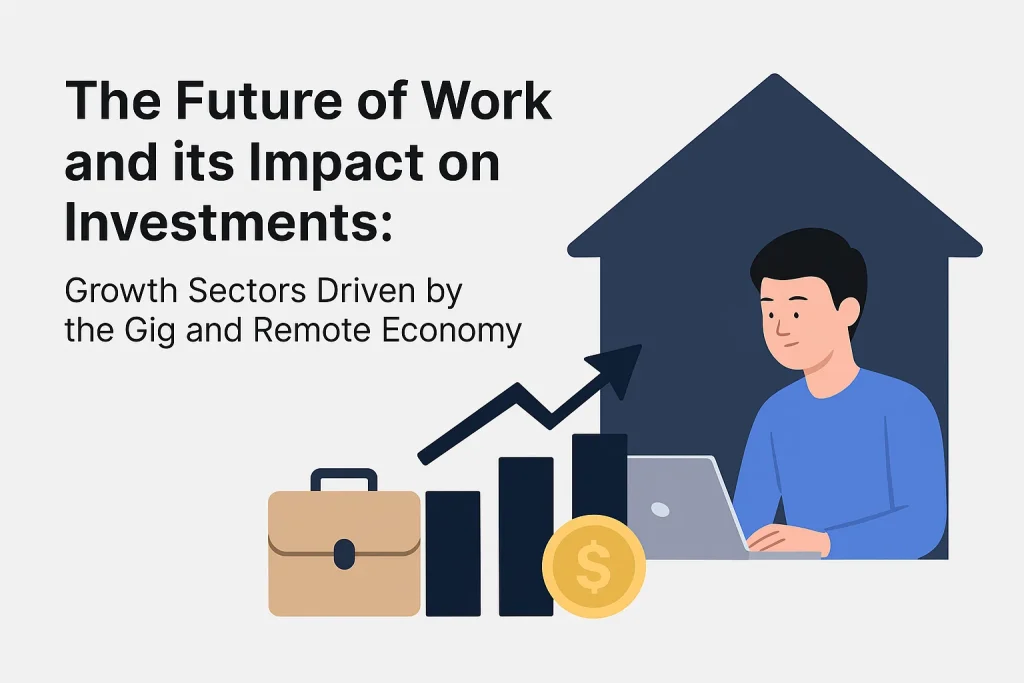The evolving nature of work is reshaping the landscape for investments. As traditional employment paradigms give way to more flexible options such as freelancing and remote work, new opportunities are emerging for investors. Fueled by technology and changing societal norms, the gig and remote economy is not just a fleeting trend but a powerful movement influencing various market sectors.
Anúncios
This transformation challenges investors to reassess traditional strategies and explore areas poised for growth. Understanding where to allocate resources requires a keen insight into how these shifts will impact different industries, paving potential pathways for future success.
The impact of the gig and remote economy on investments

As we dive deeper into this modern workforce, the influence of the gig and remote economy on investments becomes apparent. Investors are reevaluating portfolios to include sectors that cater to this burgeoning work model. Digital platforms, cloud technology providers, and remote collaboration tools are just a few areas experiencing increased interest and investment.
These sectors promise long-term returns as businesses adapt to support a distributed workforce. With a growing number of professionals opting for freelance roles or remote positions, companies involved in the development and enhancement of these technologies are poised for expansion, attracting the attention of savvy investors.
Key sectors thriving under the new work paradigm
Technology is at the forefront of sectors experiencing growth due to the gig and remote economy. Companies that facilitate communication and project management for decentralized teams are seeing their market value skyrocket. Software as a Service (SaaS) platforms that provide flexibility and scalability to enterprises also represent a significant investment opportunity.
Moreover, cybersecurity firms are gaining relevance, as the need to secure remote work environments becomes paramount. As data breaches grow in frequency and complexity, businesses are investing heavily in security solutions, resulting in a lucrative niche for potential investors.
Strategies for navigating the changing workforce landscape
To successfully invest in this evolving landscape, investors must adopt adaptive strategies. Monitoring technological advancements and consumer behavior trends can offer insight into where the market is heading. Investing in companies that are leaders or innovators in remote solutions is a prudent step.
Additionally, evaluating the long-term societal shifts, such as the acceptance of remote work arrangements, can inform investment decisions. Companies that adapt quickly and efficiently to these shifts will likely lead the charge in creating a sustainable, flexible work environment, therefore offering substantial returns.
Implementing practical investment tactics
For actionable investment strategies, consider diversifying portfolios to include shares in technology firms that support remote work. Investing in exchange-traded funds (ETFs) focused on innovation in work technology can also provide diversified exposure to this burgeoning sector.
Moreover, monitoring company earnings reports and market reactions to new remote work developments can provide valuable insights. Staying informed about policy changes and technological breakthroughs ensures that investors can adapt their strategies to maximize potential returns over the long term.
The future of work and its irreversible impact
The reshaping of the workplace is undeniably influencing the investment world. With the gig and remote economy gaining permanence, the sectors that support and innovate within this realm are seeing unparalleled growth, making them prime targets for investment.
Investors prepared to embrace these changes and develop strategies that recognize the transformative power of flexible work arrangements stand to benefit significantly. As the future of work continues to evolve, so too will the opportunities for those willing to adapt and invest in this new era of professional life.



